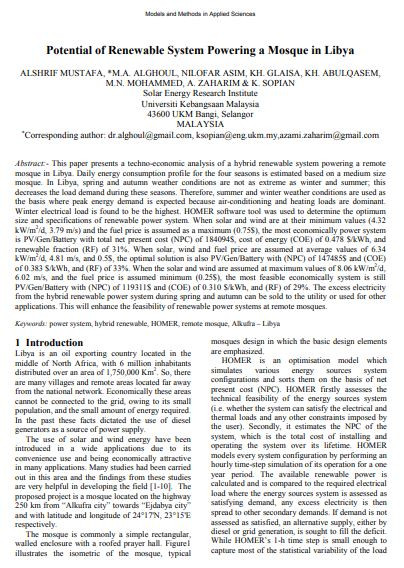
This paper presents a techno-economic analysis of a hybrid renewable system powering a remote
mosque in Libya. Daily energy consumption profile for the four seasons is estimated based on a medium size
mosque. In Libya, spring and autumn weather conditions are not as extreme as winter and summer; this
decreases the load demand during these seasons. Therefore, summer and winter weather conditions are used as
the basis where peak energy demand is expected because air-conditioning and heating loads are dominant.
Winter electrical load is found to be the highest. HOMER software tool was used to determine the optimum
size and specifications of renewable power system. When solar and wind are at their minimum values (4.32
kW/m2
/d, 3.79 m/s) and the fuel price is assumed as a maximum (0.75$), the most economically power system
is PV/Gen/Battery with total net present cost (NPC) of 184094$, cost of energy (COE) of 0.478 $/kWh, and
renewable fraction (RF) of 31%. When solar, wind and fuel price are assumed at average values of 6.34
kW/m2
/d, 4.81 m/s, and 0.5$, the optimal solution is also PV/Gen/Battery with (NPC) of 147485$ and (COE)
of 0.383 $/kWh, and (RF) of 33%. When the solar and wind are assumed at maximum values of 8.06 kW/m2
/d,
6.02 m/s, and the fuel price is assumed minimum (0.25$), the most feasible economically system is still
PV/Gen/Battery with (NPC) of 119311$ and (COE) of 0.310 $/kWh, and (RF) of 29%. The excess electricity
from the hybrid renewable power system during spring and autumn can be sold to the utility or used for other
applications. This will enhance the feasibility of renewable power systems at remote mosques.
I agree to the terms outlined below:
You agree to upload and assign Mosqpedia Database the rights to use the content worldwide and in perpetuity across all current and future media platforms. Mosqpedia Database may edit, copy, adapt and translate your contribution.
The content will be distributed under the Creative Commons Attribution-Deed – Attribution-NonCommercial-NoDerivatives 4.0 International – Creative Commons
All data will be stored in line with data protection regulations.